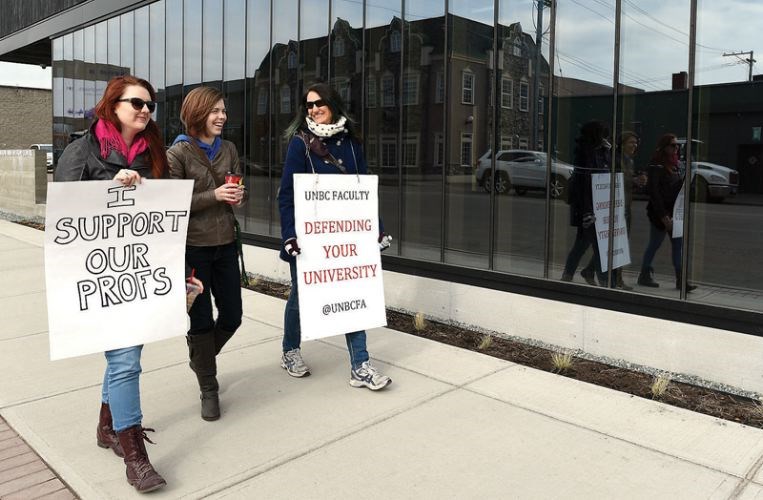The war of words between faculty and administrators at the University of Northern B.C. continued Tuesday, day six of the faculty strike.
In a post to the UNBC website late Monday, university president Daniel Weeks addressed compensation and the next steps from the administration's perspective.
Weeks, who has been criticized by the faculty association for his silence, started the post to say personal family matters had kept him from negotiations.
"I want to reassure all of you that I have been at the helm and providing direction to our senior leadership and the university's negotiating team," he wrote.
Each side contends the other walked away on Friday, the last time the bargaining teams met after three days of negotiations.
Weeks said, "the faculty association bargaining committee chose to walk away from negotiations on Friday," while the faculty contend when its team left "we were facing empty chairs on the other side of the room" after the university said it would not be tabling a response to the faculty's most recent proposal.
No new dates have been scheduled and classes have been cancelled Wednesday.
The faculty association was quick to send a press release responding to Week's post Tuesday afternoon, arguing "the report is replete with misrepresentations."
Weeks argued the proposed five-year agreement of annual wage increases of 0 per cent the first year, one per cent the second and 1.5 per cent the final three years follows the provincial government's Economic Stability Mandate - something he pointed out has been accepted in past public sector agreements.
Weeks acknowledged a substantial compensation gap for exists for UNBC faculty due to its fixed Career Development Increment (CDI).
The university's current proposal seeks to "enhance the range" of CDI from $0 to $1,111 and $0 to $3,700, with an average of $2,000 by 2018.
"Simply put, the CDI rewards career development and reflects a substantial effort to address the compensation gap," Weeks wrote.
But faculty argue the system itself is flawed.
"In truth, the employer's proposal will destroy our compensation system rather than fix it, by giving administration full discretion over the amount of our career development increases... Starting salaries for faculty tend to be much lower than other professions. To compensate for the low starting salaries, typical university salary systems have regular annual career development increments that allow faculty a reasonable career salary. These annual increments at UNBC are less than half the increments at almost every other university in the country."
Weeks said the university's fiscal reality won't allow for such an agreement and remain sustainable. He pointed to its $68 million annual operating budget and declining enrolment (this year by 5.9 per cent) as key factors. He said UNBC relies on the provincial government for 67 per cent of its operating budget, which declined this year by $572,000.
"The challenge is to find ways to resolve a gap that has emerged over 20 years and as a consequence of previous agreements between faculty and the university. The university's fiscal realities and responsibilities as a public university with an eye to a sustainable future create additional challenges," Weeks wrote.
The faculty, however, say UNBC has healthy finances.
"Referring to audited financial statements, which are a representation of fiscal reality, we can see that UNBC reported revenues of some $107 million in the last fiscal year for which data are available. General Operating Surpluses are large, and have been growing over the last five years. As (independent arbitrator) Vince Ready recognized in 2014, UNBC can pay its faculty fairly."
Over five years, the university's proposal translates to a 5.5 per cent increase to faculty wages valued at $4.5 million after two previous years where faculty saw 2.5 per cent increase each year.
"For comparison, during those same two years, UNBC's CUPE support staff wages increased by two per cent in each year, non-management exempt employee wages increased two per cent in each year, and all managers, directors, and senior administrators experienced a wage freeze mandated by the government of B.C.," Weeks wrote.
This, the faculty said, this isn't true for management.
"Publicly available data show that administrators received substantial increases. For example, from 2010 to 2014 UNBC's vice president (of) finance received base-salary increases of 3.5 per cent, 1.6 per cent, 8.3 per cent, and 2.8 per cent," the faculty wrote.
The university maintains the cumulative cost of the faculty's proposal equals more than $20 million, including benefits. The faculty has disputed this number as an example of creative math but hasn't provided its own equation, arguing it can't begin to talk numbers until the university agrees to the premise of re-mapping its salary structure.
Week's full statement can be found online at unbc.ca/faculty-relations and the faculty's response can be found online at unbcfa.ca/updates-for-fa-members.



